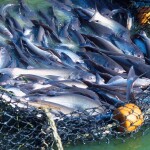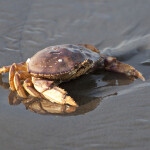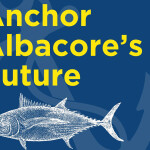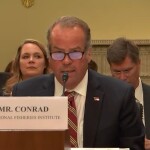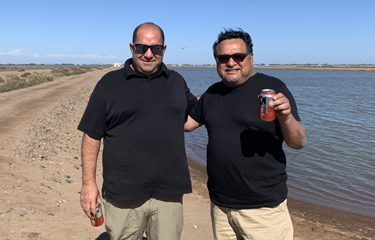Two of the founders of Del Pacifico Seafoods have left the company and are forming a new business focused on importing Fair Trade-certified seafood into the United States.
Del Pacifico Seafoods imports wild-caught shrimp from Mexico, primarily from eight artisanal shrimp cooperatives fishing along Mexico’s Pacific coast. The company led the fishery to enter a fishery improvement project and to obtain Fair Trade certification in 2016. Annual landings for the artisanal shrimp fishery, based in Sinaloa reached two million pounds in 2016, valued at USD 14 million (EUR 12.7 million).
Sergio Castro and Danny Alva, who began working on creating Del Pacifico in 2014, left the company due to a disagreement with their third business partner, Alva told SeafoodSource. Alva joined Del Pacifico full-time in 2019 as director of sales and product development after spending more than 30 years in international and domestic sales at Ocean Beauty Seafoods. Alva did not name the third partner, but GC1 Holding has been listed as a major partner of Del Pacifico since 2019.
“Three years ago, we took on a partner who brought in a lot of cash to the business. In the wild seafood industry, you have to pony up a lot of cash up front. They were a good partner in that regard with the cash. We thought they had the same philosophy as us, but a year later, the culture of the company started changing,” Alva said. “Sergio was butting heads with the other side. One thing led to another and Sergio was asked to resign in March. They asked me if I would continue running the company, but I said no, I wouldn’t leave my partner behind. So they asked how much time I needed and I said 31 May, because I wanted enough time to make sure my customers were taken care of.”
Del Pacifico’s entire Mexican sales team and its marketing team, as well as “a big part of the production and procurement staff” also decided to leave the company, Alva said, to join a new start-up – the Sustainable Seafood Project, which will be based in Culiacan, Mexico and will focus on importing seafood carrying Fair Trade certification.
“What Del Pacifico offered me was a social component to my work. I was interested in the human interest part of Fair Trade – that’s why I left Ocean Beauty, because I wanted to help people and empower fishermen. Since 2014 through this year, we contributed between USD 1.5 million and USD 2 million [EUR 1.2 million and EUR 1.7 million] back to local communities in Mexico through the Fair Trade program. I personally saw that we helped put air conditioning in a lot of schools in the region and equipped a local library with satellite wi-fi,” Alva said. “Those types of projects attracted me, and we want to do that on a bigger scale with Sustainable Seafood Project, to get involved in the social and sustainability component of artisanal fisheries globally, not just in Mexico.”
Castro, based in Mexico, will be the chief executive officer of the new firm, while Alva, in Los Angeles, California, U.S.A., will serve as managing director. Alva said the company’s processing facility will be located in Sinaloa and will open in the next two weeks. Besides handling wild-caught shrimp from Mexico, it will also handle farmed Mexican shrimp as well, Alva said. In the future, the Sustainable Seafood Project is looking to expand into farmed black tiger shrimp from Indonesia, tuna from the Maldives and Philippines, and mahi from Peru, though Alva said progress on that particular fishery is halted likely until 2023, after the results and fallout of the upcoming Peruvian presidential election are known.
Alva said they will be partnering with the Blueyou Group, a Swiss consulting firm for sustainable aquaculture and fisheries, and may the company’s products under Blueyou’s Selva brand.
“All of our products are going to be 100 percent chemical-free, artisanal, low carbon footprint and minimal bycatch, with a social component, which matches very well with Blouyou’s mission,” Alva said. “Taking care of the oceans is what we’ve always believed in and that’s what we’re headed for. Our partner at Del Pacifico we took on didn’t want to go in that direction, and that’s fine, but we want to make a bigger social impact.”
Del Pacifico’s operations were not affected by COVID-19 and the company had its best year ever last year, according to Alva. And an embargo put in place earlier this month by the U.S. government on wild-caught Mexican shrimp has not had an impact on Del Pacifico’s operations either, he said.
“As far as the embargo, it’s just a question of clarifying where our shrimp was coming from. The embargo was mainly to punish industrial fleets that didn’t have the right fishing gear. Our shrimp comes from panga boats that are operated by a single man. Because of the way our fishery operates, using panga boats with sails, there’s really no way we can kill one turtle. So it hasn’t had an effect on the business.”
Alva and Castro attempted to buy out their partner at Del Pacifico in order to keep the business intact, but were unsuccessful, he said.
“I wish they would have allowed us to buy it, but the negotiations didn’t work out. I don’t know what future of that company is, I can’t speak to that honestly, but for us, it was just not meant to be,” he said.
Del Pacifico holds the Fair Trade certification for the Sinaloan artisanal shrimp fishery and will retain that certification, but Alva said he hopes to apply for and receive Fair Trade certification for the fishery through Sustainable Seafood Fund by January 2022.
“We helped bring their shrimp to the world, and they really appreciate the fact that we helped put them on the map and get a better value for product,” Alva said. “As we go about creating the new company, we are confident they will remember us and know that we share their values.”
Alva expressed disappointment with how his tenure at Del Pacifico ended but said he felt like he needed to follow his own course.
“You can make a lot of money doing things the wrong way but at the end of the day, at 3 a.m., when you’re staring at the ceiling, facing your own self, you ask yourself, are you doing the right thing?” Alva said. “I truly believe that biggest problem we have in the world right now is an economic imbalance. There’s so much poverty. We want to try to empower local fishermen financially so they can make a better living, and Fair Trade is going to be part of that.”
Photo courtesy of Danny Alva

